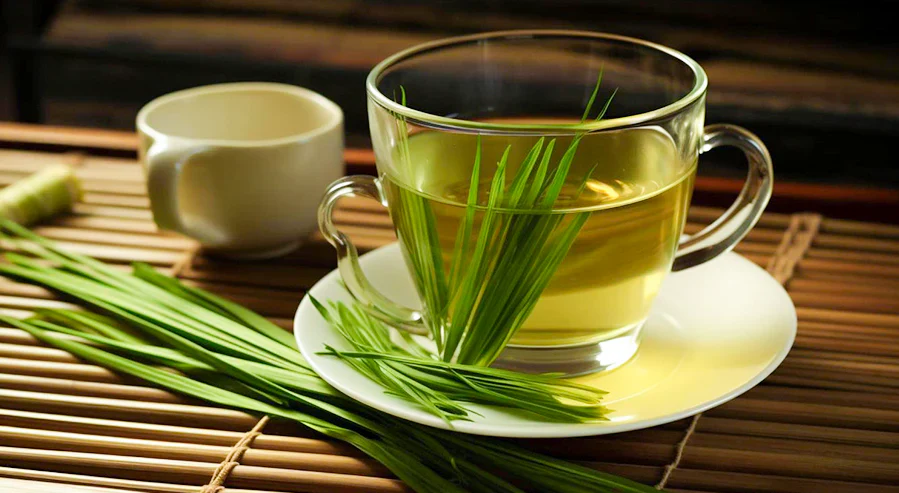Table of Contents
Introduction to Lemon Grass Tea
Lemon grass tea is more than just a simple brew with an enticing scent; it has a fun taste and plenty of potential health benefits. But how many of those tasty lemony cups would affect their bodies? Lemon grass tea is said to help build up a person’s immunity and boost the process of digestion. If you wish to calm your body after a long, stressful day, lemon grass tea serves that purpose. So, if you are okay with brewing a cup of lemongrass tea, let us delve into its deliciousness and many health benefits over a cup.
Origins and History of Lemongrass

Lemongrass, or Cymbopogon, is a plant that likely originates in the tropical. Southeast Asia is where it liquefies the most. It has for centuries in ancient cultures been used both for cooking and medicine.
Traditionally, lemongrass could be taken as a tea to help alleviate different ailments. Its applicability as a medicine was known to folklore traditions in Thailand, and modern science later shifted towards lemongrass in India. More than just a flavour, lemongrass is known to have health benefits.
With the growth of the trade routes, lemongrass spread to almost all parts of the world. Its appeal and demand started in the kitchen owing to its fresh flavour and soothing lemon scent. Nowadays, people tend to think of it only regarding dishes, particularly from Asia, ignoring its many advantages and rich history.
Nutritional Benefits of Lemon Grass Tea
Lemon grass tea is quite delicious, but that’s not the only thing it has to brag about. Tea is full of nutrients, nourishing the body in various important aspects. Lemongrass is rich in vitamins A and C and even vitamin B complexes, all essential for the body. In addition, lemongrass also contains substantial quantities of potassium, calcium, magnesium, and iron, all of which are beneficial. Potassium manages blood pressure since magnesium controls muscle movement.
Also, this flavorful tea is a good source of antioxidants which combat free radicals.
By behaving like this, they are likely to lower the oxidative damage to your cells.
Furthermore, the intake of fibre improves digestion as well as gut health. When taken in sufficient quantities, it can aid the smooth workings of your digestive system.
And it is not only for the enjoyment of the taste; the vitamin content gives lemon grass tea a boost as well, which would be great for those wanting to improve their health.
Health Benefits of Drinking Lemon Grass Tea
Integrating lemon grass tea into your routine will not only be a great experience but also improve your health. As lemon grass tea contains many antioxidants that help maintain a healthy body, it is effective in detoxification.
Its most popular area of usefulness is aiding digestion.
This aromatic beverage effectively soothes a queasy stomach and allows for reduced bloating, especially after heavy meals.
Lemon grass tea is bioactive, which allows it to assist in cooling down the body and, in many cases, support weight control as well—furthermore, the natural diuretic aids in flushing away toxins while keeping you hydrated.
Moreover, having this herbal infusion also has anti-inflammatory responses. Having a few portions regularly can help one with arthritis or muscle pain by helping eliminate the most impacted regions.
On the contrary, though, lemon grass tea might give otherwise pleasing results for people who want more clarity and control over their lives. With the cacophony that ensued, numerous teas were able to help some while simultaneously.
How to Make Lemongrass Tea at Home
Making lemon grass tea at home is a lot of work. Start by getting some fresh lemongrass stalks, ideally available in supermarkets or Asian marketplaces.
Trim the stalks from the harder parts on the ends and reverse peeling dry outs on those stalks. Cut them into smaller bits to maximize the food’s essential oils.
Now boil some water in a pot. Add approximately two tablespoons of cut lemongrass for every cup of water. If you wish, adjust the steep time between 5 to 10 minutes, depending on how intense you want your beverage to be.
Before drinking the revived drink, filter the particles within the drink. You can also sweeten it with honey and add ginger and lime. Relish a nice drink!
Other Uses for Lemongrass
Lemongrass is not just great for spiceing up your tea. It has a wide range of applications that go even beyond the cup.
In cooking, it puts a tangy lemon touch on the food. Lemongrass is usually added by chefs in soups, curries, or in some marinades. It matches with cheese, seafood, and chicken, which tastes great.
When you leave the kitchen and move to where the lemongrass can shine, the herb excels at aromatherapy. Lemongrass essential oil is marketed for its mood-boosting effects. It helps relieve tension and promote calmness and is frequently used in diffusers and massage oils.
Also, lemongrass has been known to work as an insect repellent. Its pungent odour keeps away mosquitoes and other bugs, making it ideal for outside events.
Some use lemongrass for the skin. The lotion helps prevent skin irritations or acne, resulting in the required inflammation response when infused correctly in a lotion or cream.
With so many uses, it’s obvious that lemongrass is not just about making a nice cup of tea.
Possible Side Effects and Precautions
Let’s review the side effects of lemon grass tea while also checking out its benefits. You may experience skin rashes and diarrhoea, but that is only if you are allergic to lemongrass, which is rare. Using lemongrass and tea should be avoided in that case.
It is best for pregnant women and women who are currently breastfeeding to first consult their doctor before consuming the herbal drink, as it does have some side effects. The safety of lemon tea during pregnancy hasn’t been established.
Drinking an excessive amount of tea could also lead to stomach upsets as well as diarrhoea, which the high citral could trigger. Lemongrass consumption during the meal should be moderate; for most people, it should be one or two servings, which would be adequate.
A lot of people are prescribed medication; Consult with a doctor first, and let them know if you are thinking about using lemongrass as it affects blood sugar levels and anticoagulants. That way, you can reduce the risks of the lemon infusion and fully enjoy it.
Conclusion
Lemon grass tea is a beverage that quenches thirst and solves numerous health problems yet to be explored. Every amazing invention has a story; lemon grass tea has distinct origins and a rich history, which has, in turn, made sure that it attracts over time. Since it’s rich in nutrients, it can provide good nutritional value and improve quality of life.
Regular consumption of lemongrass tea can provide various benefits, such as easing the bowel and providing antioxidant support. Owing to its medicinal value, it can also be consumed after a long, active day to relax. Beyond that, preparing lemon grass tea is as easy as boiling some water, which you pour over dried or fresh lemongrass to make a nice infusion.
In addition to tea, lemongrass is silverscreened through cuisine, aromatherapy, and other mediums, which shows its diversity. But as with any herbal medication, it’s helpful to read about general warnings and side effects of lemongrass before using it.
Adding lemon grass tea to your daily habit can boost wellness and give you a wonderful taste. Then why wait? Try this infusion today; your body might thank you later!
FAQs:
1. What is lemon grass tea?
Lemon grass tea is considered a very simple drink to prepare where stalks or the leaves of lemongrass plant are infused in hot water. This tea is herbal and is made of lemongrass, which has a tangy taste and several benefits.
2. How does lemon grass tea boost digestion?
Lemon grass tea includes compounds that destroy food, lessen bloating, and facilitate a functioning gut, which is a great help for digestion aids.
3. Is lemon grass tea useful for cleansing the body of toxins?
Lemon grass tea contains many innocent antioxidants which aid the body in cleansing and providing general detox.
4. Can lemon grass tea help with stress relief?
Lemon grass tea has properties that actively relieve mild stress and promote a soothing effect after a long day when lemongrass tea is consumed.
